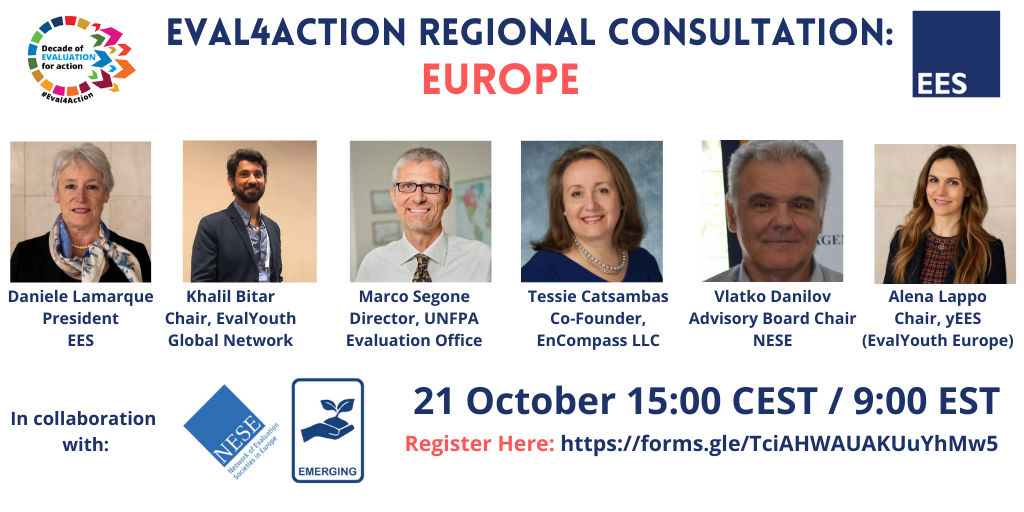
Context for the Eval4Action Regional Consultation in Europe
As noted in EES’ previous blog post, “in such turbulent times of baffling crises, contradiction and uncertainty, we – as an evaluation community – should come together, debate and agree on new ways of doing our professional work to better respond to the global challenges of environmental degradation, social and economic inequities, and political unpredictability.”
In 2015 the United Nations created a framework for tackling such global issues by adopting Sustainable Development Goals (SDGs). In Europe, there is a recognition of the importance of implementing the SDGs, but very often this is disconnected from how decision-makers report on their achievements, are held to account, and how we all learn how to substantially improve our actions within our own borders.
As evaluation professionals, we have a fundamentally important role to play in this, and also have many of the skills needed to do so, but we need to play a more proactive role demonstrating how and what evaluation can contribute to this crucial area of policy.
While there is now a general consensus that the SDGs are important, the region is still grappling with the urgency of implementing them.
The general recognition is that SDGs play a lesser role in the European political context since the plans for economic recovery, heavily impacted by COVID-19, have been prioritized. In this context, governments switch to rapid and non-transparent actions and VOPEs play an even more negligible role in contributing to social betterment. This leads us to the following questions:
- How can VOPEs contribute to acceptance and implementation of SDGs?
- Is there a need to address new target groups?
- Can we unite our efforts in envisioning a more sustainable and more equal world?
At the same time, the SDG’s success depends on implementers and evaluators moving away from the current siloed-approach, to a more integrated one that utilises systems-thinking to better tackle these integrated issues within the overall agenda of sustainable development.
Campaigns such as the Decade for Action, and the accompanying Decade for Evaluation for Action (Eval4Action), bring much-needed attention to this issue, and the vital role evaluation can pay in helping to implement the SDGs.
The EES-hosted Eval4Action European Regional Consultation
As also introduced in a previous blog post, EES is an official partner of the Eval4Action campaign, which aims to mobilize and spur commitments from decision-makers, the evaluation community and other stakeholders to develop stronger national evaluation systems and capacities, to support delivering the SDGs by 2030, while ensuring that no one is left behind.
As part of Eval4Action’s ongoing series of regional consultations, EES, along with NESE and yEES, will be hosting the European consultation on October 21st, 2020 at 15:00 CEST. The purpose is to raise awareness and kick-start this discussion on a regional level.
The objectives of this regional consultation are:
- To contribute to the Eval4Action Campaign, and show that the Europe is in solidarity with other regions
- Explain the situation of SDGs implementation and evaluation’s role in this process in Europe
- To get the chance to share my ideas during the discussion in the break out rooms
- To be part of the process of systematically advocating for evaluation to play a role in SDGs implementation, together with other partners
- Provide examples to European national VOPEs on how to get engaged, and facilitating a discussion where they can express their views on the issue
- For EES to depict the urgency of transformations that evaluation must go through and demonstrate in order to face the challenges of Anthropocene
The main focus of the event are the interactive, small group discussions that will debate the overall question:
How can evaluation help ensure a transformative recovery from COVID-19,
one that addresses the crisis, reduces risks from future potential crises
and relaunches the implementation efforts to deliver the 2030 Agenda
and SDGs during the Decade of Action?
Specifically:
- What is the role of VOPEs in this challenge?
- What competencies do evaluators in Europe have to face this challenge?
- What can we learn from other regions to work globally on transformations we desire, rather than merely reacting to each crisis as it arises?
This webinar is free and open to the public to join. We invite all practitioners, academics, and interested parties in evaluation and European policies to join us by registering here. We look forward to seeing you on 21 October, and for any questions please email the EES Secretariat.
